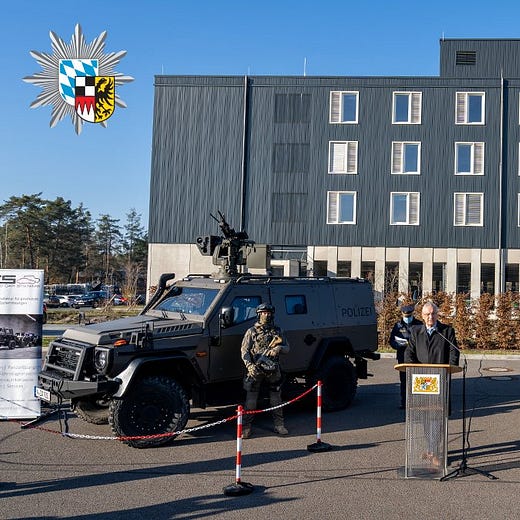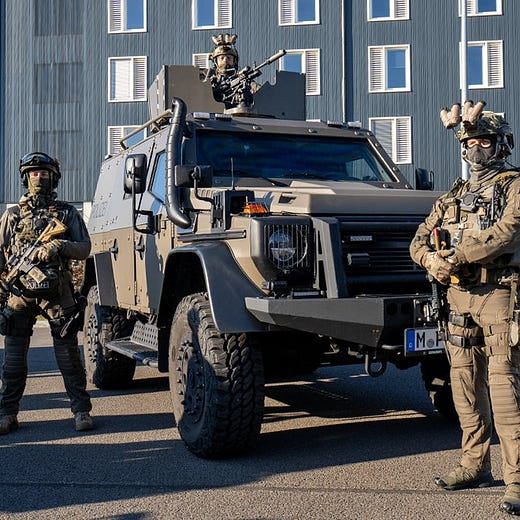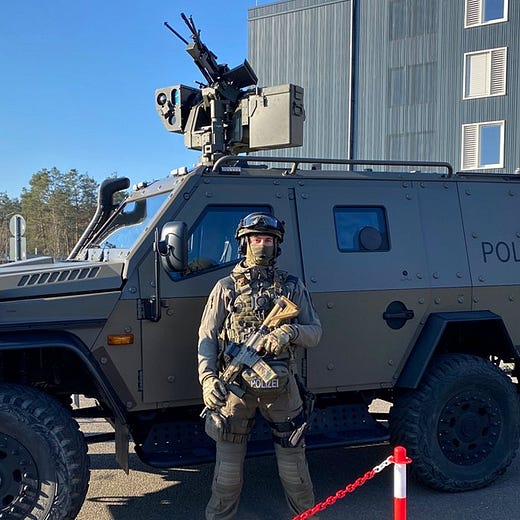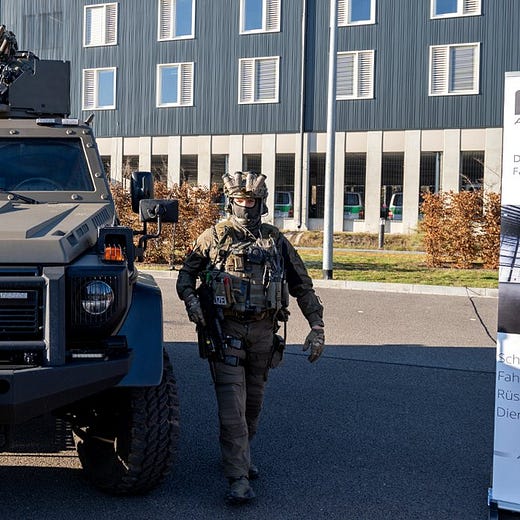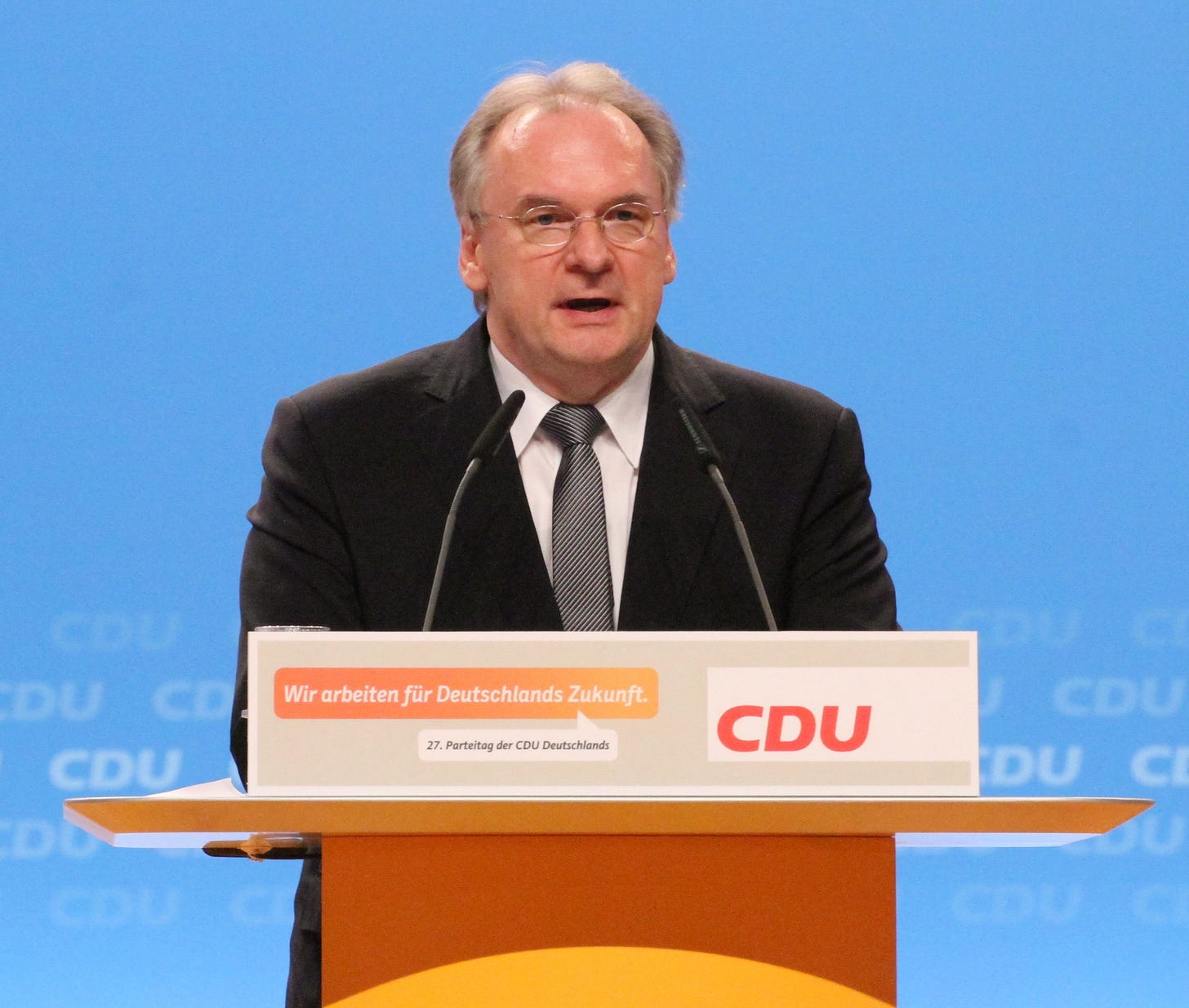Here come the Bavarian tanks!
This newsletter is a 4-minute read
Dear Readers,
Today we’re talking about a new Sonderweg, a beefed up Bavarian police, stamp prices and more…
Regards,
Jörg & Axel
Forward this newsletter to your friends - we rely on you to grow
1. Tübingen goes its own way
If there’s one German politician who loves the sound of his own voice more than Bavarian prime minister Marcus Söder, it is mayor of Tübingen Boris Palmer. Once hyped as a future leader of the Greens, the 48 year old is now the embarrassing uncle everyone else in the eco-party tries to avoid. First he criticized Merkel’s refugee policies, then he suggested we should be more worried about poverty in Africa than elderly Germans threatened by the coronavirus: both are grounds for banishment from the Green garden of Eden.
Palmer, who’s been a sharp critic of lockdowns, announced at the start of November that his town would follow its own strategy, which he grandly named “the Tübinger Appeal.” He prioritized protection of the elderly over general restrictions: townsfolk over the age of 65 have received free FFP2 face masks; they’ve been chaperoned in taxis so as to avoid buses; and they’ve been given exclusive shopping hours at supermarkets. Palmer’s enemies have derided the strategy as “age discrimination” - against the elderly.
Now the results are in - and the project has been a massive success. At least that’s if you ask Mr Palmer himself, who's been busy telling the world what an amazing job he’s done. According to the Tübingen mayor, not a single person in the town over the age of 75 is currently infected and the hospital’s intensive care station is caring for a third of the corona patients that it did during the spring. If only Berlin had listened to him, the rest of the country wouldn’t be teetering on the brink of a hard lockdown, he’s claimed.
Statistics produced by the national intensive care register seem to back him up. Less than 10 percent of Tübingen’s intensive care beds have corona patients in them, a much better ratio than the 20 percent in nearby Stuttgart. But critics say that other towns in the southwestern state of Baden-Württemberg have followed similar strategies - with equal success - they just don’t brag so loudly about it.
2. Bavaria’s new firepower
On Tuesday, we reported on Bavaria’s headline grabbing, but vacuous decision to call a disaster situation in response to the pandemic. While we would argue that the policy was mainly about making sure Markus Söder stayed in the national spotlight, at least it didn’t cost the taxpayer €2.4 million. That’s the price Mr Söder has just paid for two armoured vehicles complete with machine gun turrets on their roofs. The machines have been bought for the Bavarian police and are apparently needed for armed response to terror attacks or so-called Amokläufe. At the launch event, the khaki-clad police officers looked more like soldiers in a war zone.
Mr Söder’s sidekick, interior minister Joachim Herrmann, proudly claimed that the armoured cars would serve the whole state from bases in Munich and Nuremberg. One wonders how much time he thinks the police normally have to react to a terror attack. The driving time between Nuremberg and Regensburg, for example, is an hour and fifteen minutes. Still, the vehicles are equipped to drive up steep slopes, so if ISIS plans to erect a new caliphate on the Zugspitze, Bavaria is ready for them.
3. Haseloff wins!
It looked like there was no way out of the corner Saxony-Anhalt’s CDU had manoeuvred themselves into with the refusal to approve an 86 cent increase of Rundfunkbeitrag (public broadcasting fee). The state’s prime minister, Reiner Haseloff, couldn’t convince his parliamentary faction to approve the increased public broadcasting fee. The deadlock was threatening to collapse his coalition due to alleged “collusion” between the CDU ad AfD (see previous two newsletters.)
Now Mr Haseloff has performed an escape act with the simplest of tricks - he simply pulled the bill. The SPD and Greens criticized the stunt but couldn’t collapse the coalition as there has been no vote... and thus technically no “co-operation” between the CDU and AfD.
The CDU faction succeeded in stopping the fee increase and Mr Haseloff both saved his neck and spared his party a national embarrassment. In reality he’s just kicked the can down the road. Now all 16 states have to go back to the drawing board before a new proposal is put in front of state parliaments again (Saxony Anhalt’s was the only one to refuse the increase). Meanwhile the public broadcasters have threatened to go all the way to the Bundesgerichtshof to get their hands on the €1.5 billion (which the 86 cents/month per household amounts to). But by the time a decision has to be made, the CDU might have an actual leader...
4. A few cents here, a few cents there...
It’s possible that Germany’s public broadcasters learned the old adage that “many a mickle makes a muckle” from another monopolist, the Deutsche Post. The 2019 increase in stamp costs for a domestic letter from 70 to 80 cents has added €150 million to the “yellow giant’s” bottom line.
Private logistics firms aren’t happy. They’ve called in the Monopolkommission, which is not in fact a board game business, but an independent agency tasked with advising the government on competition law. The agency is siding with the Bundesverband Paket und Expresslogistik, a lobby group for independent postage companies, which argues that the ten cent increase has given die Post an unfair advantage.
5. Closing the right flank

Germany’s domestic intelligence agency goes under the bombastic name of Bundesamt für Verfassungsschutz - Federal Office for the Protection of the Constitution. For historic reasons, Germany has a complicated relationship with its intelligence services, and the Verfassungsschutz has been accused of political bias. Two years ago the agency’s boss, Hans-Georg Maaßen, came under fire for several statements playing down the threat from the far-right. After he was sacked from the agency he had led for six years, he claimed that he’d been the victim of a left-wing fix up.
His successor Thomas Haldenwang is, like Maaßen, a CDU man. But he is singing a different tune. He has declared right-wing terror the main threat to German security and his agency is putting its money where its mouth is. This week Haldenwang announced that both the newly established Querdenker movement, which protests the government’s corona policies, and Saxony’s AfD chapter might be placed under surveillance. The Querdenker are suspected of anti-Semitism, and in Saxony the AfD is believed to have open lines of communication with the neo-Nazi scene. Putting the AfD under surveillance is one small step towards actually banning the party, something that Germany is one of few democracies to be able to do.
Like what you’re reading? German current affairs and news straight to your inbox three times a week. Subscribe here to get the Hochhaus newsletter:
Who we are:
Jörg Luyken: Journalist based in Berlin since 2014. His work has been published by German and English outlets including der Spiegel, die Welt, the Daily Telegraph and the Times. Formerly in the Middle East.
Axel Bard Bringéus: Started his career as a journalist for the leading Swedish daily Svenska Dagbladet and has spent the last decade in senior roles at Spotify and as a venture capital investor. In Berlin since 2011.





